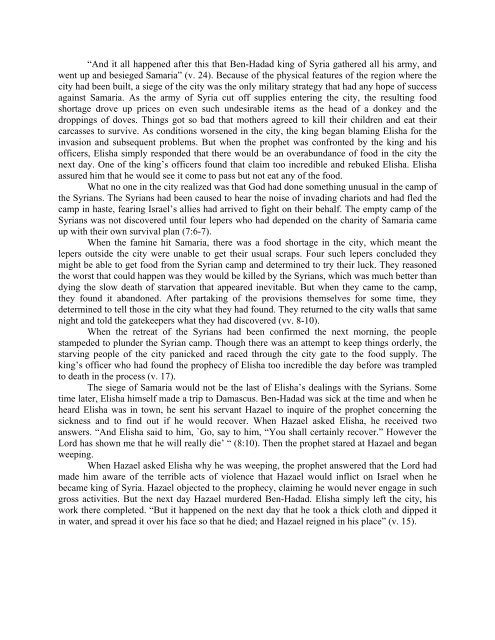A Journey Through The Old Testament - Elmer Towns
A Journey Through The Old Testament - Elmer Towns
A Journey Through The Old Testament - Elmer Towns
Create successful ePaper yourself
Turn your PDF publications into a flip-book with our unique Google optimized e-Paper software.
“And it all happened after this that Ben-Hadad king of Syria gathered all his army, and<br />
went up and besieged Samaria” (v. 24). Because of the physical features of the region where the<br />
city had been built, a siege of the city was the only military strategy that had any hope of success<br />
against Samaria. As the army of Syria cut off supplies entering the city, the resulting food<br />
shortage drove up prices on even such undesirable items as the head of a donkey and the<br />
droppings of doves. Things got so bad that mothers agreed to kill their children and eat their<br />
carcasses to survive. As conditions worsened in the city, the king began blaming Elisha for the<br />
invasion and subsequent problems. But when the prophet was confronted by the king and his<br />
officers, Elisha simply responded that there would be an overabundance of food in the city the<br />
next day. One of the king’s officers found that claim too incredible and rebuked Elisha. Elisha<br />
assured him that he would see it come to pass but not eat any of the food.<br />
What no one in the city realized was that God had done something unusual in the camp of<br />
the Syrians. <strong>The</strong> Syrians had been caused to hear the noise of invading chariots and had fled the<br />
camp in haste, fearing Israel’s allies had arrived to fight on their behalf. <strong>The</strong> empty camp of the<br />
Syrians was not discovered until four lepers who had depended on the charity of Samaria came<br />
up with their own survival plan (7:6-7).<br />
When the famine hit Samaria, there was a food shortage in the city, which meant the<br />
lepers outside the city were unable to get their usual scraps. Four such lepers concluded they<br />
might be able to get food from the Syrian camp and determined to try their luck. <strong>The</strong>y reasoned<br />
the worst that could happen was they would be killed by the Syrians, which was much better than<br />
dying the slow death of starvation that appeared inevitable. But when they came to the camp,<br />
they found it abandoned. After partaking of the provisions themselves for some time, they<br />
determined to tell those in the city what they had found. <strong>The</strong>y returned to the city walls that same<br />
night and told the gatekeepers what they had discovered (vv. 8-10).<br />
When the retreat of the Syrians had been confirmed the next morning, the people<br />
stampeded to plunder the Syrian camp. Though there was an attempt to keep things orderly, the<br />
starving people of the city panicked and raced through the city gate to the food supply. <strong>The</strong><br />
king’s officer who had found the prophecy of Elisha too incredible the day before was trampled<br />
to death in the process (v. 17).<br />
<strong>The</strong> siege of Samaria would not be the last of Elisha’s dealings with the Syrians. Some<br />
time later, Elisha himself made a trip to Damascus. Ben-Hadad was sick at the time and when he<br />
heard Elisha was in town, he sent his servant Hazael to inquire of the prophet concerning the<br />
sickness and to find out if he would recover. When Hazael asked Elisha, he received two<br />
answers. “And Elisha said to him, `Go, say to him, “You shall certainly recover.” However the<br />
Lord has shown me that he will really die’ “ (8:10). <strong>The</strong>n the prophet stared at Hazael and began<br />
weeping.<br />
When Hazael asked Elisha why he was weeping, the prophet answered that the Lord had<br />
made him aware of the terrible acts of violence that Hazael would inflict on Israel when he<br />
became king of Syria. Hazael objected to the prophecy, claiming he would never engage in such<br />
gross activities. But the next day Hazael murdered Ben-Hadad. Elisha simply left the city, his<br />
work there completed. “But it happened on the next day that he took a thick cloth and dipped it<br />
in water, and spread it over his face so that he died; and Hazael reigned in his place” (v. 15).
















